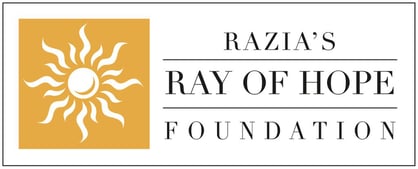
Razias Ray Of Hope Foundation
Razia’s Ray of Hope Foundation provides girls young and women in Afghanistan with free, award-winning K-12 schooling and post-secondary programs. Our model of transformative, community-based education incubates strong leaders, builds career pathways, and creates peaceful cultural change within an educational cycle that impacts present and future generations.
Founder and president Razia Jan, humanitarian and CNN Top 10 Hero, has worked for decades to build connections between Afghans and Americans while improving the lives of girls and young women in Afghanistan through education and opportunity.
Razia’s Ray of Hope Foundation would not exist without the spirit, vision, and tireless efforts of founder and president Razia Jan.
Born in Afghanistan, Razia moved to the United States in 1970. The proprietor of a small tailoring business in Duxbury, Massachusetts, for 20 years she served as president of the town’s Rotary Club. In the aftermath of September 11, Razia rallied her adopted New England community to send over 400 homemade blankets to rescue workers at Ground Zero after September 11. Her efforts expanded to include sending care packages to US troops in Afghanistan. Through her involvement in the military’s Operation Shoe Fly, she coordinated the delivery of over 30,000 pairs of shoes to needy Afghan children. Her handmade quilts commemorating September 11 have been exhibited at Madison Square Garden, the chapel at the Pentagon, and at fire stations in New York and Massachusetts.
Razia has received many awards for her humanitarian work (see below for chronology), including a 2012 CNN Top 10 Hero award, the 2007 Woman of Excellence award from Germaine Lawrence Inc., multiple Rotary Club International Peace Awards, and certificates of appreciation from the Army Corps of Engineers and the American Legion. She has spoken on women and children’s issues at venues across the United States as well as in Europe and Afghanistan. In 2014, Razia was named Social Innovator by the Lewis Institute at Babson College and in 2015 she was awarded a Woman of Action award from Rotary International at the United Nations in New York City. In 2016, she was honored with Rotary International’s Service Above Self Award.
Razia has served as a member of the Interfaith Council, the No Place for Hate Committee, and Jordan Hospital’s board of directors.
Today, in order to continue her humanitarian work, school administration, fundraising efforts, and spending time with family, Razia travels between Afghanistan and the United States.
Financials
Programs
Zabuli Education Center (ZEC)
The Zabuli Education Center provides free education to Afghan girls in kindergarten through grade 12. Where many schools fail to meet even rudimentary standards, our school is exemplary. A Ministry of Education official said of the Zabuli Education Center: “It is perfect.”
Founded by Afghan native Razia Jan, the school was named for the late Abdul Madjid Zabuli, a businessman and philanthropist who improved education in Afghanistan. The school is located 30 miles outside of Kabul in Deh’Subz, a district with roughly 100,000 residents including a large number of nomadic families.
Rebuilt in 2007, our three-story building sits on the historic site of a former boys’ school. The gift of a beloved Afghan king in the 1930s, the original building had been all but destroyed by 30 years of war. Read more about our history here.
In addition to providing young Afghans with an education on par with Western schools, we also supply our students with uniforms, shoes, warm coats, and meals.
Razia Jan Institute (RJI)
The Razia Jan Institute is the first women’s post-secondary vocational school in rural Afghanistan. Opened in March 2017, the Razia Jan Institute (RJI) sits adjacent to the Zabuli Education Center.
RJI is a tuition-free, two-year midwifery training school that facilitates health-sector employment. In addition to midwifery training, we provide classes in English, personal finance, and computer literacy.
Beginning with the first class of certified midwives that graduated in March 2019, RJI will continue to matriculate 20 to 25 midwives every other year. These trained community health care workers provide life-saving services to a severely medically-underserved area while improving social, health, and economic outcomes for themselves and their villages.
The new facility includes a clinic where midwifery students train alongside doctors and midwives. Solar panels are installed on the institute's roof, lapping up the rays, and white curtains embroidered with small blue butterflies festoon every window. As required by the Afghan Ministry of Public Health, the facility is carpeted in order to minimize airborne dust (an essential strategy to safeguard hygiene in Afghanistan).

